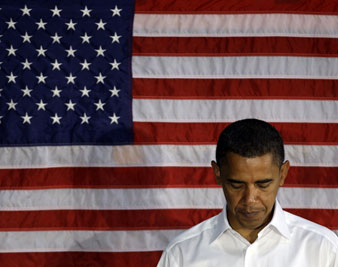 AP Images
AP Images
Robert Scheer is the editor of Truthdig, where this article originally appeared. His latest book is The Pornography of Power: How Defense Hawks Hijacked 9/11 and Weakened America (Twelve).
A president has only so much capital to expend, both in tax dollars and public tolerance, and Barack Obama is dangerously overdrawn. He has tried to have it all on three fronts, and his administration is in serious danger of going bankrupt. He has blundered into a deepening quagmire in Afghanistan, has continued the Bush policy of buying off Wall Street hustlers instead of confronting them and is now on the cusp of bargaining away the so-called public option, the reform component of his health care program.
Those are not happy sentences to write for one who is still on the e-mail list of campaign supporters urged to back the president in the face of attacks that are stupidly small-minded. But to remain silent about his errors, just because most of his critics are so vile, is hardly an example of constructive concern for him or the country.
Yes, Obama was presented with a series of crises not of his making but for which he is now being held accountable. He is not a “socialist” who grew the federal budget to astronomical proportions. That is the legacy of George W. Bush, who raised the military budget to its highest level since World War II despite the end of the Cold War and the lack of a formidable military opponent– a legacy of debt compounded by Bush’s decision to first ignore the banking meltdown and then to engage in a welfare-for-Wall-Street bailout. And it was Bush who gave the pharmaceutical companies the gift of a very expensive government subsidy for seniors’ drugs.
But what is nerve-racking about Obama is that even though he campaigned against Bush’s follies he has now embraced them. He hasn’t yet managed to significantly reduce the U.S. obligation in Iraq and has committed to making a potentially costlier error by ratcheting up America’s “nation-building” role in Afghanistan.
Just as he was burdened with the Afghanistan situation, Obama was saddled with a banking crisis he didn’t cause, and the worst that can be said of his attempted solutions to the financial mess is that they were inherited from Bush Treasury Secretary Henry Paulson. But Obama, who raised questions before his election about the propriety of a plan that would rescue the banks but ignore the plight of ordinary folks, has adopted that very approach as president. He elevated Lawrence Summers and Timothy Geithner, the two Democrats most closely aligned with Paulson’s policy, to top positions in his government.
Obama’s proposed new regulations, while containing some kind words about better informing consumers, do not portend any breakup of the “too big to fail companies” whose problems were permitted to fester by previous deregulatory measures. His answer is to increase the regulatory capacities of the Federal Reserve, which failed to use its already existing and considerable powers to avoid the debacle. The promise is that next time the Fed will behave better. As Obama put it Monday, “So our plan would put the cost of a firm’s failures on those who own its stock and loaned it money. And if taxpayers ever had to step in again to prevent a second Great Depression, the financial industry will have to pay the taxpayer back every cent.”
Why not now? And why has he accepted the Wall Street line that all this represents a “collective failure,” as if the con men and the conned had equal responsibility? According to Obama, “It was a failure of responsibility that led homebuyers and derivative traders alike to take reckless risks that they couldn’t afford to take. It was a collective failure of responsibility in Washington, on Wall Street, and across America that led to the near-collapse of our financial system one year ago.”
Hogwash. The chicanery of the financial system, securitizing highly suspect mortgages, was codified into laws that made the hustle legal.
That insistence on equating the swindled with the swindlers is also what is wrong with the evolving health care reform plan. The assumption from the beginning, when Obama reached out to insurance companies to come up with a deal, was that they had the interest of their customers at heart. They don’t, and it is the purpose of government regulation in the area of health as well as banking to even the scales between the powerful corporations and the consumers from whom they profit. That is the purpose of a public option worth its name.
Without a government program as a check on medical costs, Obama will end up with a variant of the Massachusetts program, one that forces consumers to sign up with private insurers and costs 33 percent more than the national average. He will have furthered the Bush legacy of cultivating an ever more expensive big government without improving how the people are served.


